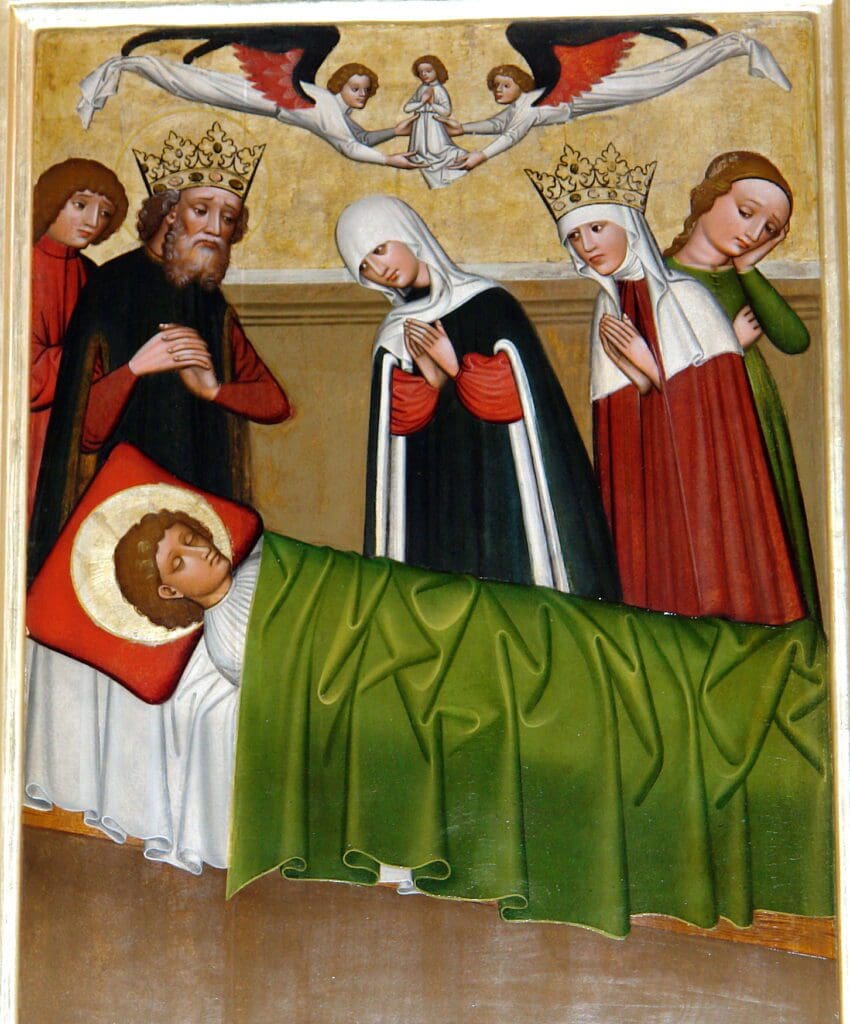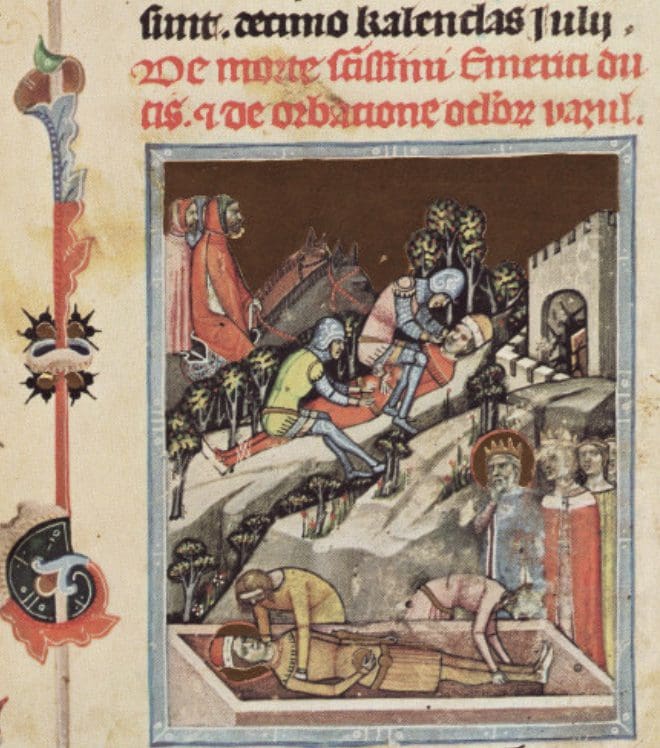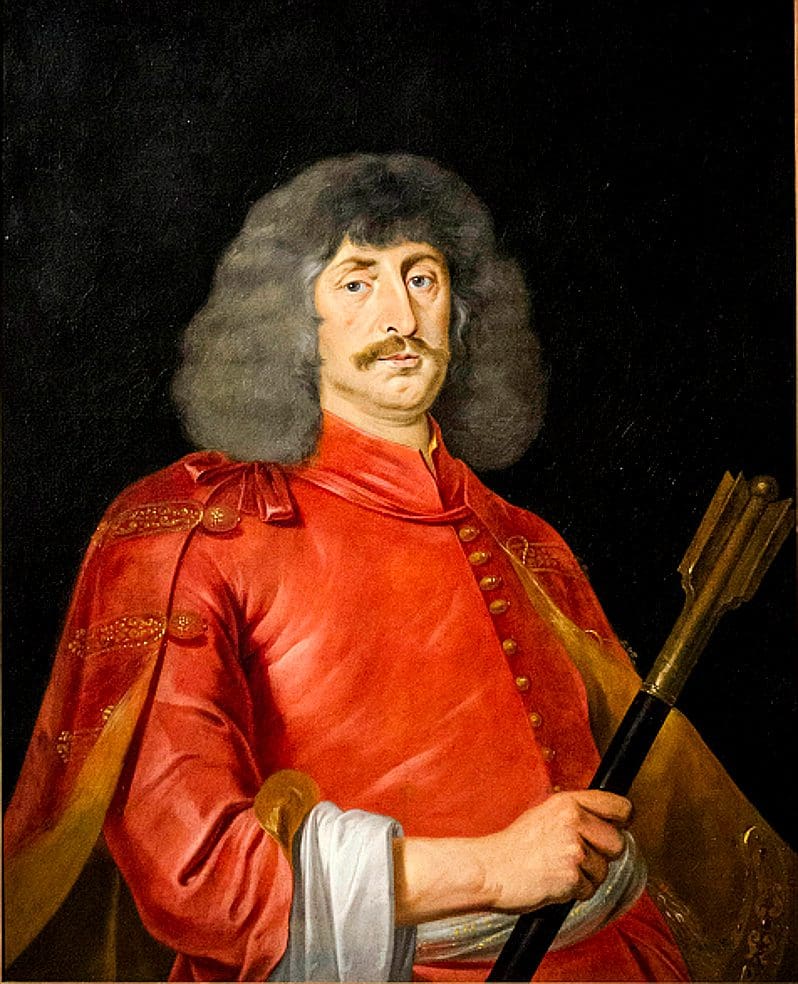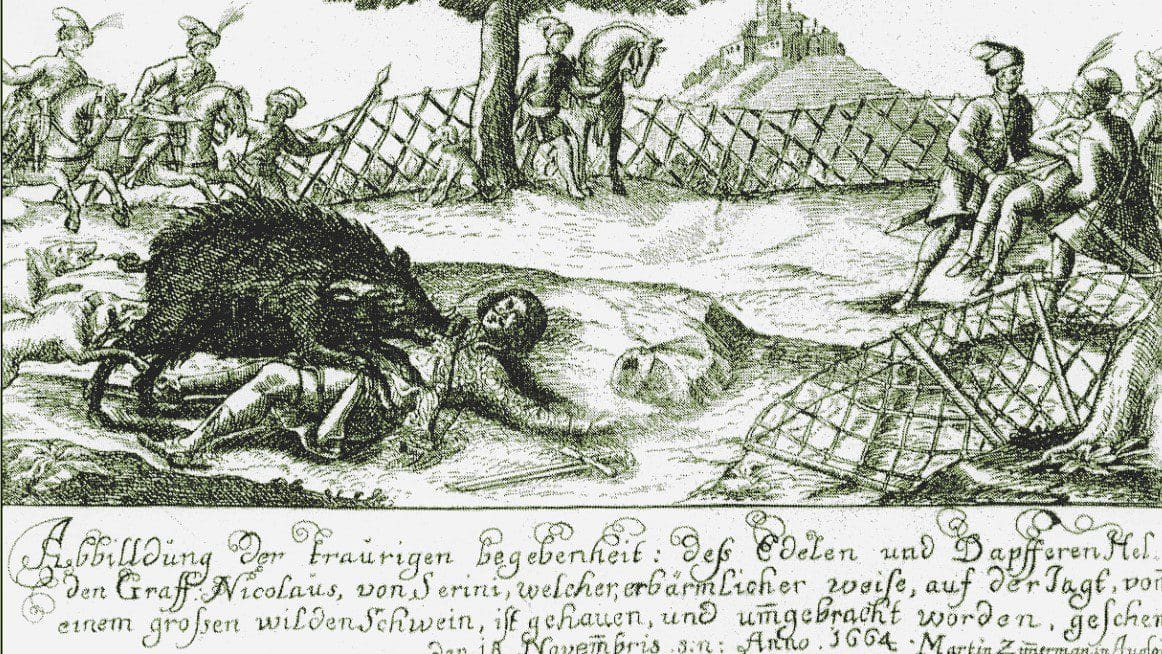Wild boars are not exactly a recurrent theme in the lives of historical or political actors. Yet, the figure of the wild boar, this trivial forest animal, plays an outsized role in Hungarian history, or at least, historical memory. Not only one, but two prominent Hungarian historical figures were killed by such beasts. One of them was Prince Emeric, son of, and heir to the first king of Hungary, Saint Stephen. Emeric died at a young age on 2 September 1031, after being fatally injured by a boar during a hunt. Miklós Zrínyi, the Ban of Croatia, died a very similar death in 1664.
These tragedies are not only interesting in their own right, but also because each happened to prominent figures, during turning points of Hungarian history and therefore they gave rise to speculation. Many believe, regarding both events, that they were politically motivated assassinations rather than accidents. On the anniversary of Prince Emeric’s death on 2 September 1031, it is worth examining what we actually know about these two legendary boar attacks, and separate facts from legend.

The Death of Prince Emeric: Germans, Pretenders, or Accident?
The exact date of birth of Prince Emeric is unknown, but what is certain is that he was born between 1000 and 1007. He was the son of Saint Stephen, the first King of Hungary. With primogeniture having been introduced shortly before, he was the first to be raised as the heir to the throne of Hungary. Among other things, Stephen wrote the Admonitions, a letter on the precepts of becoming an ideal Christian ruler, for Emeric and he also designated the German Bishop Gerard to educate his son. The prince, however, was never able to assume the crown, as he died in 1031, during a hunting in the Igfon Forest of Bihar County in Eastern Hungary. According to the Chronicon Pictum, an enraged wild boar mortally injured Emeric.
To this day, there are those who believe that his death was in fact a deliberate murder, rather than an accident. It is partly so because the circumstances of the incident are unclear. In addition,
Emeric’s death was good news for the Holy Roman Empire,
as the German rulers wanted to occupy, or at least subjugate, Hungary. Therefore, the death of the heir and the expected political instability they could have ensued was in their interest. And indeed, Peter Orseolo, the successor of Stephen, was in a weak position, and was forced to rely on German support, risking pushing Hungary into the sphere of influence of the Holy Roman Empire. Furthermore, Saint Henry, the ruler of Bavaria, died around this time. Since he had no offspring, Emeric was also among the possible successors, but the Holy Roman Empire opposed having a Hungarian ruler in Bavaria, one of the largest states of the realm. However, critics of this theory argue that the main reason behind the strained Hungarian–German relationship was territorial disputes, and not the Bavarian or the Hungarian throne.
On the other hand, it is not just the Germans who have been accused of the murder. According to the late historian László Szegfű, Vazul, a prince and member of the royal dynasty, conspired with a Turkic-Pecheneg assassin, called Tonuzoba, to murder Emeric. Szegfű argues for this theory by pointing out that the Chronicon features the funeral of Emeric and the blinding of Vazul on the same page, connecting the two events.

Furthermore, Vazul was a possible pretender, therefore eliminating the prince was in his interest. Szegfű also adds that the clan name Vazul, and the name Tonuzoba allegedly contain the Turkish equivalents of ‘wild boar’. However, critics, like historian János Bollók, question the etymology, noting that the meaning of the words in question is pig, rather than boar, and also point out that there are no sources indicating that such conspiracy and murder would have taken place. The Catholic Church later canonized Emeric, but as a confessor, and not a martyr murdered by pagan conspirators. So all in all,
there is no credible proof of Emeric having fallen victim to an assassination:
the theories that suggest that scenario rely on a simple cui prodest reasoning, nothing else.
The Curious Case of Miklós Zrínyi: Did the Habsburgs Hire a Boar?
On 18 November 1664, Miklós Zrínyi, a Croatian Hungarian aristocrat, military leader, and poet, Ban of Croatia, died near Csáktornya (Čakovec, Croatia), from injuries suffered when attacked by a wild boar. Similarly to Emeric, he had the fatal encounter during a hunt. This hunting accident also led to plenty of speculation.
Zrínyi was born in 1620, into one of the richest aristocratic families of Hungary. As the grandson of the older Miklós Zrínyi, the hero of the Battle of Szigetvár, the younger Miklós
was a strong proponent of expelling the Ottomans from Hungary, and possibly, from Europe.
Zrínyi petitioned the Habsburg Court with his grand plans, mainly about creating a European alliance against the Turks, and attacking them from two fronts. The Ottoman Empire was battling Venice on the Mediterranean Sea at the time, so Zrínyi’s idea, although ambitious, made sense. He stood every chance to be elected Palatine of Hungary, but the Habsburg ruler, Leopold I, did not nominate him for the post, apparently because of his Protestant connections. Zrínyi spoke several languages and was very erudite, authoring many books, both on war studies, and on the necessity of driving out the Turks. Later, he took part in the 1663–1664 Austro-Turkish War, during which he defeated the Ottomans multiple times. However, the shameful Peace of Vasvár, which, despite the Habsburg–Hungarian victory, left many territories in Ottoman hands, enraged him. He requested an audience with the emperor, who was also the king of Hungary. However, his fateful hunting prevented that meetings from ever taking place.

On 18 November 1664, Zrínyi joined a smaller party to hunt wild boars in a forest near Csáktornya. After the men took two boars, a third one was wounded by one member of the party, and Zrínyi decided to pursue the beast. The Ban followed the blood tracks and found the boar. It is unclear what happened next, but one of his companions found Zrínyi, deep in the forest, badly mauled, with fatal injuries.
Rumours about a Habsburg conspiracy started to spread immediately after Zrínyi’s death. The public was unable to accept that such a great national leader died so suddenly, just as he was about to force the Habsburgs into taking a harder line on the Turks. Furthermore, the imperial court indeed was relieved when they learned about the death of Zrínyi, since the Habsburgs considered his position on Turkey unrealistic, and because he also fired up the Hungarian public opinion regarding this issue. The Habsburgs even feared that Zrínyi could start an armed uprising against them. However, despite all these considerations,
there is no practical proof or indication that the there was foul play by the Habsburgs.
Conclusion
As a result of the coincidental alignment of several factors, the hunting accidents became central to the often conspiratorial, anti-Habsburg and anti-German Hungarian nationalistic historical memory. While there is little evidence to support that theory, many believed and believe to this very day that both Emeric and Miklós Zrínyi were ordered to be killed by the German powers that be. What is behind this conviction is the kuruc sentiment fearing the German domination of Hungary. Because the Holy Roman Empire indeed frequently attacked Hungary during the 11th century, and the Habsburgs in many ways opposed the liberation of Hungary from Turkish rule in the 1660s, these negative experiences constituted a fertile ground for the myths that lived on. In a sense, the wild boar itself became a symbol: the symbol of conspirators who take out inconvenient leaders on behalf of powerful and evil adversaries.
Related articles:








